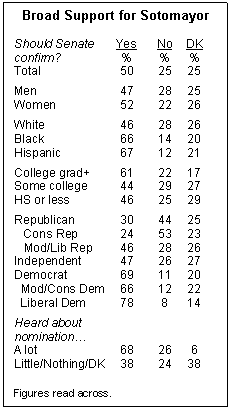
Half of the public (50%) says that the Senate should confirm Sonia Sotomayor to replace retiring U.S. Supreme Court Justice David H. Souter. By contrast, only a quarter (25%) says the Senate should not confirm the federal appeals court judge from New York, while another quarter (25%) did not express an opinion.
Sotomayor has strong support among Democrats, especially liberals, as well as among non-Hispanic blacks, Hispanics and college graduates. Meanwhile, Republicans are internally divided over whether President Obama’s first Supreme Court pick should be confirmed.
The opinions of moderate and liberal Republicans are much like the nation as a whole (46% support confirmation, 28% are opposed). Conservative Republicans stand staunchly in opposition; by a greater than two-to-one margin (53% to 24%), conservative Republicans say Sotomayor should not be confirmed.
Impressions of Sotomayor
About as many Americans say Sotomayor is a moderate (34%) as describe her as a liberal (31%). Fewer than one-in-ten (8%) say she is conservative, while 26% offer no opinion.
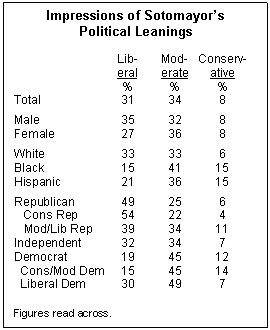
While Republicans and Democrats differ in their impressions of Sotomayor’s ideology, there also are divisions within both parties. A majority of conservative Republicans (54%) say Sotomayor is liberal while 22% say she is moderate. Moderate and liberal Republicans are more evenly divided – 39% say she is liberal and 34% moderate.
Democrats generally view Sotomayor as moderate – more than twice as many say she is moderate (45%) than liberal (19%). However, liberal Democrats are more likely than than conservative and moderate Democrats to describe Sotomayor as liberal (30% vs. 15%). Like the public, independents are evenly divided, with 32% saying she is liberal and 34% saying she is moderate.
By greater than two-to-one (41% to 15%), more African Americans say that Sotomayor is moderate rather than liberal. More Hispanics also view her as moderate (36%) than liberal (21%). Non-Hispanic whites are evenly divided (33% liberal, 33% moderate).
Importance of Court Issues
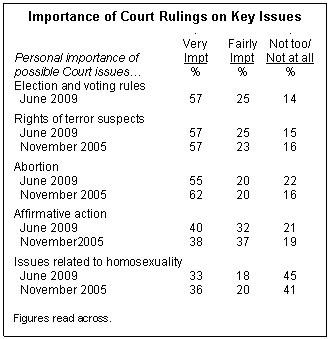
Among the issues that may face the Supreme Court in coming years, comparable majorities say that election and voting issues (57%), the rights of terrorist suspects (57%) and abortion (55%) are very important to them personally. Smaller percentages view affirmative action (40%) and issues related to homosexuality (33%) as very important.
These opinions have shown little change since November 2005, although fewer people now cite abortion as very important (55%) than did so four years ago (62%). Since 2005, there has been an 11-point decline in the percentage of Democrats rating abortion as very important (from 68% to 57%); fewer independents also view abortion as very important personally (58% in 2005, 50% currently). There has been no change in the views of Rep ublicans; as in 2005, 62% regard abortion as very important to them personally.
For the most part, there are only modest partisan differences in opinions about the personal importance of issues that may come before the Supreme Court. About six-in-ten Democrats (62%) say that court decisions about election and voting rights are very important to them personally, compared with 55% each for Republicans and independents. However, this is a particularly important issue for African Americans – 78% say it very important – compared with 53% of whites and 60% of Hispanics.
There are partisan differences over the importance of affirmative action. About half of Democrats (49%) say court decisions on this are very important, compared with 39% of Republicans and 35% of independents. A majority (59%) of African Americans say that affirmative action issues that come before the Supreme Court are very important to them personally, compared with 42% of Hispanics and 36% of whites.
Ratings of Republican Leaders
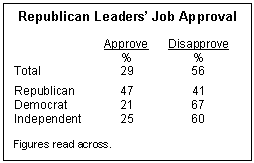
The job approval of Republican leaders in Congress remains at near record lows. Currently, 29% approve of the job Republican leaders in Congress are doing, while a majority (56%) disapproves. Approval ratings are little changed from March when Republican leaders received their lowest approval marks (28%) since Pew Research first began tracking the question in 1994.
In large part, low overall ratings for Republican leaders in Congress reflect ambivalence among those in their own party. Fewer than half of Republicans (47%) approve of the work their congressional leaders are doing; however, about as many (41%) disapprove. In addition, a majority of independents offer critical assessments of Republican leaders in Congress: 60% disapprove of their performance, just 25% approve. Democrats are predictably critical of the performance of Republican leaders (67% disapprove), but no more so than Republicans are of Democratic congressional leaders (75% disapprove).
Democratic Leaders’ Approval Slips
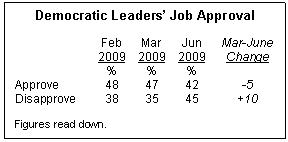
Approval of Democratic congressional leaders has slipped somewhat since earlier in the year. In February, shortly after Barack Obama’s inauguration, a 48% plurality approved of the job Democratic leaders were doing while less than four-in-ten (38%) disapproved. These generally favorable ratings held through March.
Since then, however, approval of Democratic leaders in Congress has slipped five points while disapproval has climbed 10 points. As a result, about as many now disapprove (45%) as approve (42%) of the job Democratic leaders in Congress are doing. The trend in opinion among political independents mirrors that of the general public: Currently, just 33% of independents approve of how Democratic leaders are handling their job while 53% disapprove; this represents an eight-point drop in approval from March.
Working Together?
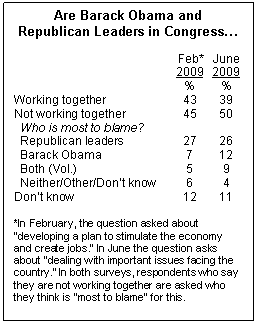
Half of the public (50%) says that Barack Obama and Republican leaders in Congress are not working together in dealing with important issues facing the country, while 39% say they are working together. Opinion was more divided in February over whether the White House and GOP congressional leaders were working together in developing a plan to stimulate the economy (45% not working together; 43% working together).
When asked who is to blame for the two sides not working together, more than twice as many say Republican leaders than say Obama (26% vs. 12%). However, the percent saying Obama is to blame is up from 7% in February, and the share volunteering that both are to blame is also up from 5% to 9%.
A majority (59%) of Republicans now say Obama and Republican congressional leaders are not working together: 28% blame Obama, 11% blame Republican leaders and 12% blame both. Democrats are more divided: 45% think they are working together and the same percentage says they are not. Many more Democrats say Republican leaders are to blame (38%) than fault Obama (2%). A majority (52%) of independents say the two sides are not working together; more than a quarter (27%) blame GOP leaders while 11% blame Obama.
Favorable Ratings: Pelosi and the Obamas
About a third of the public (35%) holds a favorable opinion of Speaker of the House Nancy Pelosi, while 41% express an unfavorable view of her. While the overall balance of opinion is mixed, far more hold a very unfavorable opinion (25%) of Pelosi than say they have a very favorable opinion (8%).
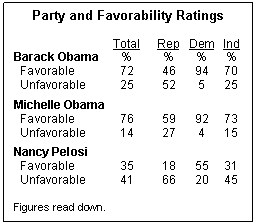
Two-thirds of Republicans (66%) hold an unfavorable impression of Pelosi, while just 18% offer a favorable opinion of the speaker of the house. Among independents, a 45% plurality offers an unfavorable impression, 31% offer a favorable one. More than half of Democrats (55%) view the speaker of the house positively, while 20% offer a negative assessment.
Barack and Michelle Obama receive much more positive ratings from all partisan groups than does Pelosi. A majority of Republicans (59%) rate Michelle Obama favorably. Her ratings are even higher among independents (73% favorable), and more than nine-in-ten (92%) Democrats express a favorable view of Michelle Obama.
Barack Obama continues to register relatively high favorability ratings. An overwhelming 94% of Democrats hold a favorable opinion of Obama, as do 70% of independents. Republican opinions are more mixed: 52% view Barack Obama unfavorably, while 46% take a favorable view of the president.
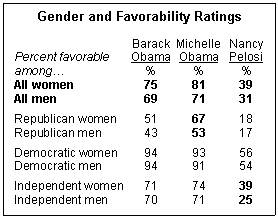
There is a modest gender gap when it comes to evaluations of these three Democratic political figures; women are 10 points more likely than men to rate Michelle Obama favorably, six points more likely to rate Barack Obama favorably, and eight points more likely to rate Nancy Pelosi favorably.
To some extent, these gaps reflect the fact that women are substantially more likely to identify as Democrats overall – 40% of women say they are Democrats compared with 28% of men. But even when party is taken into account, gender is a factor in views of Michelle Obama and Nancy Pelosi. Two-thirds (67%) of Republican women offer a favorable assessment of Michelle Obama, compared with 53% of Republican men. And Pelosi gets better ratings among women independents (39%) than among men independents (25%).




